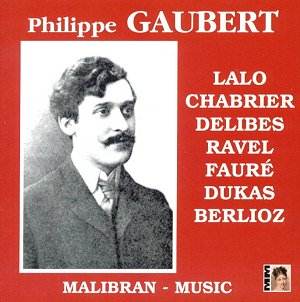Gaubert was one of
the elite Parisian flautists, studying
under Taffanel at the Paris Conservatoire.
But his ambition led him to conducting
and he soon became an innovative exponent
of new work by French composers – Fauré,
Debussy, Ravel, Dukas and Schmitt among
them. He gave the premiere performance
of Roussel’s Bacchus and Ariane, Fauré’s
Masques et Bergamasques and, most importantly,
Enescu’s Oedipe. He also recorded in
the Parisian studios for just over a
decade, from 1927-1939, and Malibran
has collected a representative sample
of his consummate musicianship, performances
of exclusively French repertoire.
The works chosen show
delicacy, luminosity and also drive.
You would expect an ex-flautist to bring
out the wind writing in the Lalo overture
and so he does, allowing one a precious
listen to that then fast vanishing school
of French wind playing, as well as more
generally crisp rhythmic incision, and
some stylish string playing. He doesn’t
overplay the extracts from Coppelia
– there’s good sectional balance and
real discipline as well. And no it wasn’t
just Monteux of that generation of French
conductors who could coax superb textures
from this repertoire – Gaubert does
it in his Ravel; lightly textured, succulent
strings, avian winds. There is some
fine, urgent brass playing in Pantomime
from Daphnis et Chloe, superb flute
playing, expertly judged climaxes too.
Danse générale
is by turns evocative and fiery.
Marguerite Long shows
her special affinities with the French
Piano school in her Fauré Ballade
and I liked the way Gaubert took the
Sicilienne from Pelleas et Melisande
– not too languorous, instead fresh
and free-flowing. For the fully in-the-round
view of Gaubert listen to his saucy
Dukas, wittily etched and vividly played
and the beautifully veiled sonorities
he evokes in the Nocturne from Shylock.
The notes are in French
and English - nothing fancy, just to
the point. The transfers are in the
main well executed and broadly non-interventionist.
That said there is some wear on a few
of the copies used and some swish on
the Ballade – toward the end of one
of the sides used: but nothing to concern
a prospective purchaser of this delightful
disc.
Jonathan Woolf
